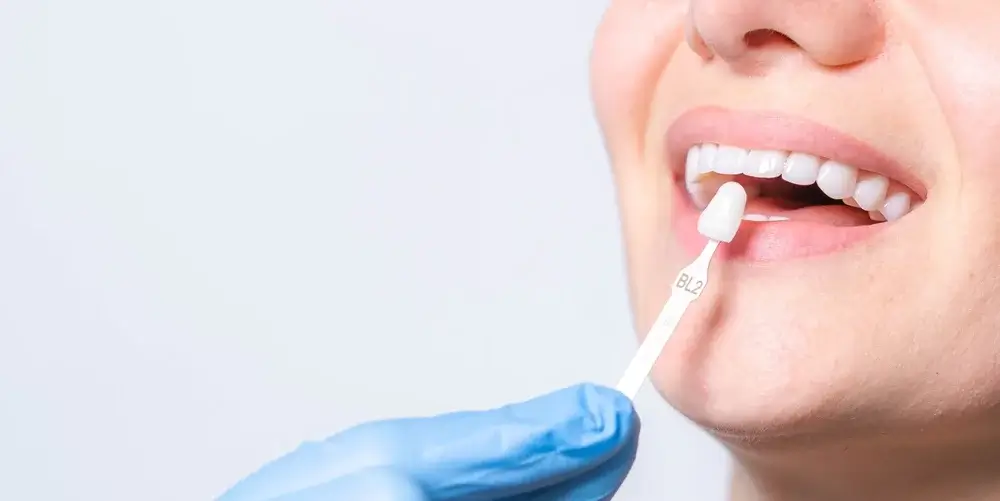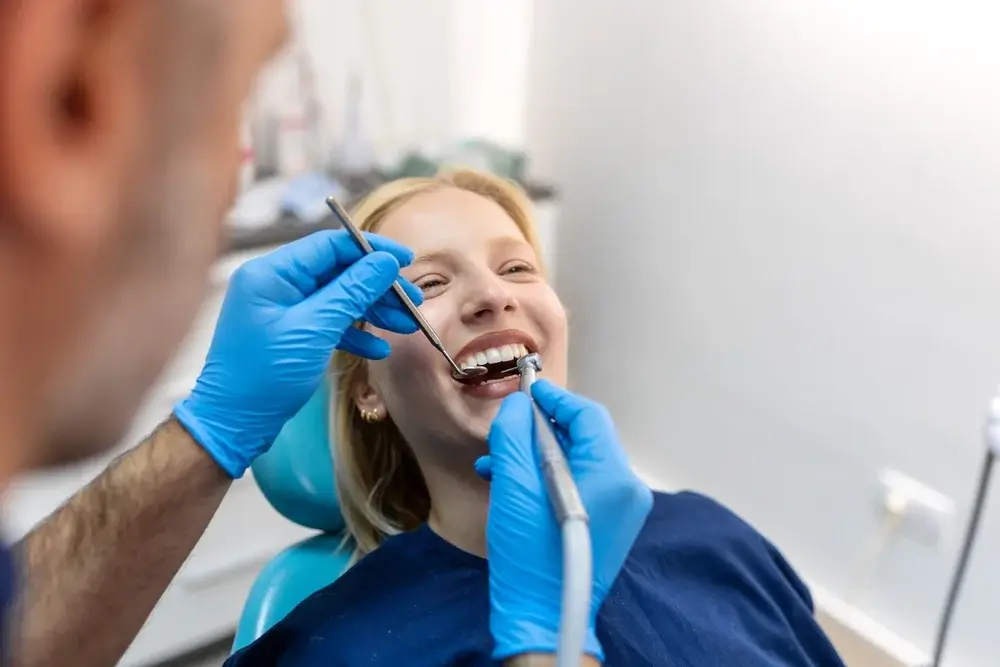Dental crowns are a reliable solution for protecting and restoring damaged teeth, offering durability and a natural appearance. However, even the best crowns may need replacement over time due to wear, damage, or other issues. Replacing a dental crown is essential for maintaining oral health and ensuring long-lasting results.
What is a dental crown?
A dental crown is a custom-made cap designed to cover a damaged, decayed, or cosmetically unappealing tooth. It restores the tooth’s shape, size, strength, and function while blending seamlessly with natural teeth. Crowns are commonly used after root canals to protect weak teeth or to enhance the appearance of a tooth.
Signs That Your Dental Crown Needs Replacement
Over time, a dental crown may exhibit signs of wear or damage, signaling the need for replacement. Here are the most common indicators:
Visible Damage
Cracks, chips, or visible wear on a dental crown are clear signs that it may no longer adequately protect the tooth. These issues can also impact the crown’s appearance, especially for front teeth, affecting confidence.
Tooth Sensitivity
If you experience increased sensitivity to hot or cold foods and drinks, it could indicate the crown is no longer sealing the tooth properly.
Discomfort or Pain
Persistent pain or discomfort around the crowned tooth might suggest issues such as decay or damage beneath the crown. An improper fit can also lead to irritation, requiring immediate evaluation by a dentist.
Gum Recession
When gums recede, the edges of the crown may become exposed, making it easier for bacteria and plaque to accumulate. This increases the risk of decay and gum disease around the crowned tooth.
Change In Fit
A dental crown that feels loose or shifts when chewing can no longer provide the stability and protection your tooth needs. Addressing this promptly prevents further complications, such as damage to the underlying tooth.

How many times can you replace a crown?
Dental crowns can be replaced multiple times as needed, but the process depends on the condition of the underlying tooth and surrounding structures. Regular dental checkups ensure your crowns remain functional, and early intervention can prevent complications.
How long do dental crowns last?
The lifespan of a dental crown varies based on several factors. These include:
Material
The type of material used for your dental crown significantly impacts its longevity. Porcelain crowns typically last 10–15 years, while metal crowns often last even longer. Choosing a high-quality material based on your dentist’s recommendation ensures durability and functionality.
Oral Hygiene
Maintaining excellent oral hygiene, including daily brushing, flossing, and regular professional cleanings, is crucial for preserving the integrity of your crown. Proper care minimizes plaque buildup and prevents decay around the crowned tooth.
Habits
Avoiding harmful habits such as teeth grinding, nail-biting, or chewing on hard objects like ice can protect your dental crown from unnecessary wear and damage. Using a nightguard or taking preventive measures for bruxism can further extend the lifespan of your crown.
Risks Of Delaying Crown Replacement
You should never delay a tooth crown replacement, as it can lead to several complications such as:
Increased Risk of Tooth Damage
A worn or damaged crown no longer provides adequate protection, leaving the underlying tooth vulnerable to further damage or decay. As the tooth becomes more exposed, the likelihood of fractures and other complications increases.
Risk of Infection
When the crown is damaged or improperly fitted, it can expose parts of the tooth to bacteria, increasing the risk of infection. This can lead to severe oral health issues, including abscesses or gum disease.
Compromised Tooth Function
An ill-fitting crown can interfere with your ability to chew or speak properly, making daily activities uncomfortable or difficult. This disruption can also cause strain on your other teeth and jaw muscles.
Costly Treatment
Neglecting crown replacement can lead to more significant dental problems, requiring expensive treatments such as root canals or even tooth extractions. Addressing issues early helps prevent the need for more costly and complex procedures down the road.

Steps To Replace A Dental Crown
The dental crown replacement procedure is straightforward and typically completed in a few visits. The process of replacing a dental crown typically looks like this:
Assessment
The dental crown replacement procedure begins with a comprehensive evaluation of the existing crown and the underlying tooth. This assessment determines whether replacement is necessary and identifies any additional treatments required to restore optimal dental health.
Preparation
The damaged crown is gently removed, and the tooth is cleaned to remove any decay or old bonding material. If necessary, the tooth may be reshaped to ensure it can effectively accommodate the new crown.
Impression
To ensure a precise and comfortable fit for your replacement dental crown, a detailed digital or physical impression of your tooth is taken. This impression captures the exact contours and alignment needed for an ideal fit.
Temporary Crown
While your custom crown is being fabricated, a temporary crown is placed to protect the prepared tooth. This ensures you can maintain normal function and comfort while the final crown is being created.
Placement
Once the permanent crown is ready, it is carefully bonded to your tooth with a strong adhesive, ensuring a seamless fit and natural appearance.
How much does dental crown replacement cost?
Several factors influence the cost of replacing a dental crown, including:
Cost Factors
The cost of dental crown replacement can vary based on the material used, the location of the tooth being treated, and the complexity of the procedure.
Insurance Coverage
Many dental insurance plans offer partial coverage for dental crown replacement, though the amount may vary depending on your policy. It’s important to check with your provider to understand the specific benefits available to you.
Out-of-Pocket expenses
After insurance coverage, patients are responsible for the remaining costs of a dental crown replacement, which can vary based on factors like the type of crown material and the specifics of the procedure. It’s advisable to discuss payment plans and financing options with your dental provider to make the treatment more affordable.
How can I prolong the lifespan of my dental crown?
Taking preventive measures ensures your crown lasts as long as possible. Here are some measures to practice:
Maintain Optimal Oral Hygiene
Brushing your teeth twice a day, flossing daily, and using mouthwash are essential for preventing decay and plaque buildup around your dental crown. Consistent oral care helps prolong the lifespan of your crown and maintain overall dental health.
Avoid Habits
Avoid harmful habits such as teeth grinding, chewing on ice, and opening packages with your teeth, as these can damage your crown.
Use Protective Gear
Wearing a mouthguard during sports or using a nightguard if you grind your teeth at night provides essential protection for your dental crowns.
Follow A Healthy Lifestyle
A diet rich in calcium and vitamin D is vital for maintaining strong teeth and gums, which can help protect dental crowns. Proper nutrition supports overall oral health and enhances crown longevity.
Regular Dental Visits
Routine checkups ensure that any issues with your crowns or other dental concerns are detected early.

Restore Your Smile with Expert Care
Replacing a dental crown is a crucial step in maintaining the health and functionality of your teeth. By understanding the signs that your crown needs replacement, the process involved, and how to prolong its lifespan, you can ensure that your smile remains bright and strong for years to come.
When it comes to dental crown replacement, Dr. Saif Shere, DMD, at Brownstone Dental in Houston, TX, is a trusted expert. With a commitment to providing top-quality care and a personalized approach, Dr. Shere specializes in dental crowns in Houston, TX, implants, and other cosmetic procedures to enhance your smile. Book a consultation today at 9824 Fondren Rd, Houston, TX 77096, and take the first step toward achieving optimal dental health.